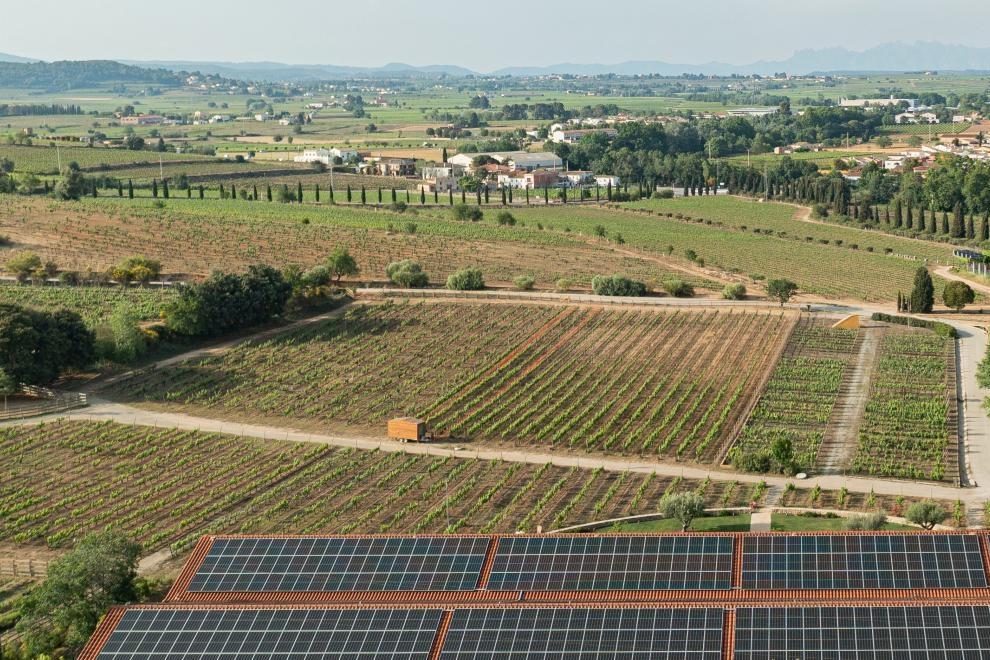Although headlines in the wine and spirits industry have been dominated by talk of tariffs and cooling markets, climate change is still a major concern—particularly for Europe. Case in point: after a record-breaking heatwave in the summer of 2024, temperatures lowered a little this year, but not by much.
When it comes to mitigating the effects of an increasing extremely climate, few companies in the wine world have treated the challenge as a strategic business opportunity quite like Familia Torres. For the fifth-generation family-owned house behind both iconic Catalan wines and Torres Brandy, building toward sustainability is also moving toward resilience, quality, and long-term profitability.
A History of Preparation
“Back in 2008, we realized the consequences of climate change and created Torres & Earth, a corporate environmental program that spans our entire operation,” says Mireia Torres, R&D Director. “It revolves around three pillars: adapting to the new climate, reducing our carbon footprint, and inspiring others to take action.”
For Torres, adaptation begins in the vineyard. Grapes are being moved to higher-altitude plots where cooler temperatures slow ripening, while rootstocks, ancestral varieties, and clones that tolerate heat and drought are being reintroduced. Of more than 60 ancestral varieties identified over 40 years, six are currently in active use, including the Selma grape in Torres’ vermouth Casals. The goal: maintain quality while safeguarding vineyards against an increasingly unpredictable climate.
That ambition extends beyond varietals. All of Torres’ Catalonia vineyards—more than 1,000 hectares—are now organic, and over half have transitioned to regenerative practices. “Regenerative viticulture actively improves soil health and ecosystem resilience,” Torres explains.
“By avoiding tillage, maintaining ground cover, and fostering biodiversity, our vineyards capture CO₂, retain water, reduce erosion, and maintain soil fertility. Over time, we expect these practices to become more cost-effective than conventional viticulture.”
Bottom-Line Bonus
This isn’t just an environmental win; it’s a business one. Torres tracks a wide range of KPIs to measure impact, from carbon footprint to packaging efficiency. The company has achieved a 40% reduction in CO₂ emissions since 2008, verified under ISO 14.064 standards. Half the energy used in the Penedès winery now comes from solar panels and biomass, and half of all process water is regenerated and reused for irrigation and cleaning. Meanwhile, lighter bottles and intermodal rail logistics reduce emissions while lowering transport costs.
Innovation also defines Torres’ approach. Carbon-capture-and-reuse technology recovers CO₂ from fermentation, while digital twin systems help optimize irrigation in regenerative vineyards. The company is planting trees and restoring natural areas to further absorb carbon and support biodiversity. “We’re combining multiple strategies to make a meaningful difference over time,” Torres says.
Climate Preparation as a Brand Differentiator
On the spirits side (operated as Juan Torres Master Distillers), the Torres Brandy Zero Challenge shows how sustainability can drive both visibility and market differentiation. Although a number of brands have launched environmental-themed challenges, the Zero Challenge distinguishes itself by moving beyond the realm of alcohol and into hospitality writ large. Projects from Mexico to Finland showcased creative sustainability in hospitality—this year’s winner transformed surplus farm produce into syrups and cordials, benefiting local farmers while reducing waste.
“By shifting the focus from cocktails to sustainability projects, we’ve increased our visibility and reinforced our brand as a leader in environmental responsibility,” says Christian Visalli, Spirits Global Managing Director.
Looking ahead, Torres expects its climate-resilience initiatives to shape its role in the premium spirits market. The combination of regenerative vineyards, innovative technology, and global initiatives like the Zero Challenge positions Torres as a model for how legacy brands can align profitability with sustainability.
By taking a long-term view, investing in environmental stewardship, and fostering collaboration, the family-owned company is not just protecting its vineyards and distilleries—it’s future-proofing its brand for a world where climate and consumer expectations are difficult to separate.

